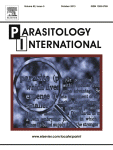
Asensitive and specific PCR assay for the detection ofBaylisascaris schroederieggs in giant panda feces
Wang N, Li DS, Zhou X, Xie Y, Liang YN, Wang CD, Yu H, Chen SJ, Yan YB, Gu XB, Wang SX, Peng XR, Yang GY.
Abstract
Baylisascaris schroederiis one of the most common intestinal nematodes in giant pandas. It can cause severe baylisascariasis which is highly infectious in its natural hosts. A rapid and reliable diagnosis of parasite infections is crucial to protect giant pandas, as well as for environmental monitoring and disease surveillance. Here, we established a specific PCR assay forB. schroederidetection which was targeting a 331-bp long fragment of the mitochondrial cytochrome c oxidase subunit II (COII) gene. Fifty fresh fecal samples collected from captive giant pandas were tested by the established PCR assay and the traditional flotation technique. DNA extracted from a singleB. schroederiegg could be successfully amplified, while no cross-reactivity was found with DNA from Ancylostoma caninum eggs. The detection rate of the PCR assay was 68%, which was higher than that of the traditional egg flotation (46%). Our findings demonstrated that the PCR assay is sensitive and specific for the detection and identification ofB.schroederieggs. Therefore, it could become a useful tool for the investigation of B. schroederi infections in giant pandas.
Copyright © 2013 Elsevier Ireland Ltd. All rights reserved.
Parasitol Int. 2013 Oct;62(5):435-6. doi: 10.1016/j.parint.2013.05.004. Epub 2013 May 18.
Read full text:http://www.sciencedirect.com/science/article/pii/S1383576913000706